City’s Live Long and Well Agenda awards $5M in grants with goal of closing health equity gaps
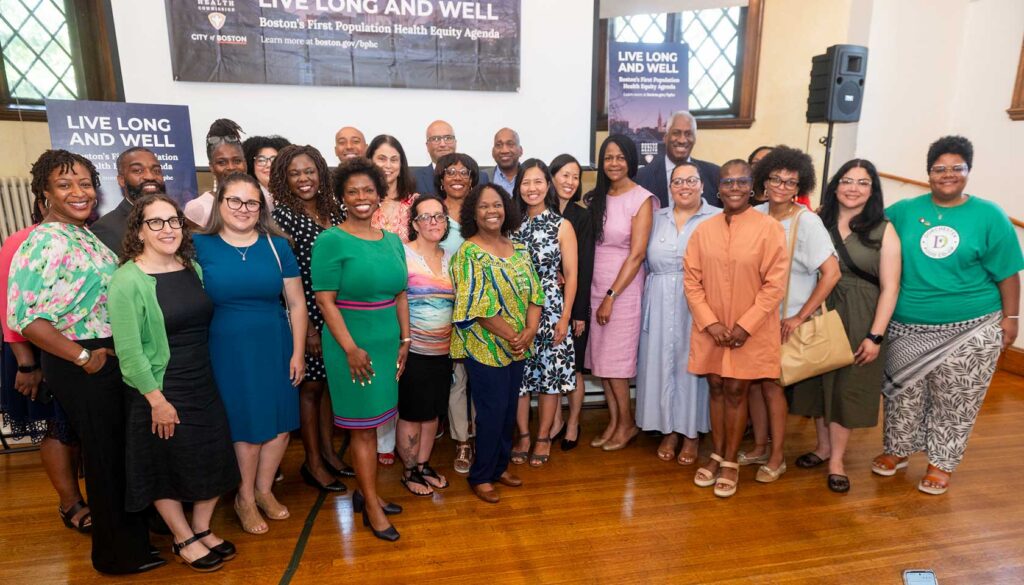
Boston will soon channel $5 million into local coalitions working to tackle longstanding health disparities that have contributed to shorter life spans in parts of the city.
The investments, part of the city’s Live Long and Well agenda, are slated to go to four coalitions of three organizations each. They were announced at a press conference, held at Codman Square Health Center, July 28.
“We believe how long you live should not depend on your race, your ethnicity or your ZIP code. All Bostonians should live long, healthy lives,” said Dr. Bisola Ojikutu, the city’s public health commissioner, at the press conference.
The $5 million, the first of two bundles of money being invested by the Atrius Health Equity Foundation through the city’s agenda, is slated to go to four coalitions. Each group, made of community-based organizations and local community health centers, is set to work together on goals aimed at addressing social determinants of health — the factors beyond a hospital’s walls that contribute to a person or community’s wellbeing, like access to housing, good food or economic mobility.
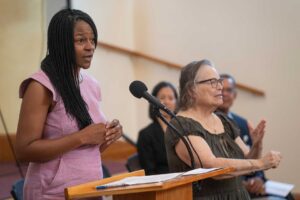
Dr. Bisloa Ojikutu, Boston public health commissioner, delivers remarks at a press conference, July 28, announcing the awardees of $5 million in grants organized by the city and funded by the Atrius Health Equity Foundation. The grants, part of the city’s Live Long and Well agenda, are the first in the city’s effort to eliminate gaps in life expectancy across Boston. PHOTO: JEREMIAH ROBINSON/MAYOR’S OFFICE
A second round of grants using funds from Atrius is slated to be released in 2028.
Ojikutu said that addressing those social determinants — especially economic mobility — is central to how the Health Commission aims to use this funding.
“It’s important for us to remember that health and equity doesn’t begin or end within the walls of our health care facilities,” she said. “Health and wellness are built and sustained within our communities.”
A community health needs assessment, which was published by the Boston Public Health Commission and the Boston Community Health Collaborative earlier this summer, identified economic mobility as a key factor in addressing community health.
It’s one that Dr. Alister Martin, founder and director of Link Health, which is a member of one of the grantee coalitions, said he sees regularly.
“Every night, in my emergency department, what I see as the biggest driver of sickness, of illness, is poverty,” said Martin, who works as an emergency room physician at Mass General Hospital. “That’s because patients who are on Medicaid or MassHealth in this state are living on some $20,000 a year or less. These folks are making a decision between paying for medication and food.”
The first of the four groups, made up of the Boys and Girls Club of Boston, Link Health and Harvard Street Neighborhood Health Center, will train alumni from the Boys and Girls Club as patient navigators through Link Health. Those patient navigators will work with an estimated 50,000 Dorchester residents to connect them with financial assistance benefits, for example, through the Supplemental Nutrition Assistance Program.
The second group, comprised of the Immigrant Family Services Institute, True Care Alliance Center and Massachusetts Association of Haitian Parents will provide English-language instruction and career training around jobs in health care, biotechnology, early childhood education and hospitality. The training will include skills around language, financial literacy, advocacy and health education, as well as career coaching and wraparound supports.
In the third partnership, the local nonprofit The Community Builders, Codman Square Neighborhood Development Corporation and the Talbot-Norfolk Triangle Neighbors United will work with eligible Dorchester residents to provide economic mobility services like housing and credit-building support, financial coaching and workforce development. It will also connect them with resources for childcare, transportation and food access.
The last of the coalitions will be comprised of Upham’s Community Care, Dorchester Food Co-op and Jamaica Plain Neighborhood Development Corporation and will focus on connecting residents to basic primary care services, plus economic mobility coaches and food services through an expansion of Upham’s Community Care outreach vans in locations in Roxbury and Dorchester.
Collaboration, Mayor Michelle Wu said, is key to the city’s approach and was central to the vision of the Atrius Health Equity Foundation, the Boston Public Health Commission and the community partners involved.
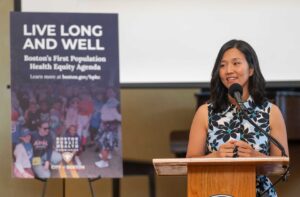
Mayor Michelle Wu delivers remarks during a press conference announcing the awardees of $5 million in grants organized by the city and funded by the Atrius Health Equity Foundation. PHOTO: JEREMIAH ROBINSON/MAYOR’S OFFICE
“Instead of just giving some grants to do some work, this is about launching new and needed coalitions, about being greater than the sum of our parts,” Wu said.
These collaborations can bring better health supports to communities, said Jay Triveldi, CEO of Upham’s Community Care.
“This work is about building trust, eliminating silos and creating the conditions where our communities can truly thrive,” he said in remarks at the press conference.
The announcement marks the latest step in the city’s Live Long and Well initiative, a population health agenda aimed at decreasing gaps in life expectancy across the city, which the Public Health Commission announced in July 2024.
When it comes to those disparities, the headliner is the 23-year gap in life expectancy between a census tract in Back Bay, where residents are expected to live 92 years, and a Roxbury census tract two miles away, where the life expectancy was found to be 69 years. That gap was identified in the city’s 2023 Health of Boston life expectancy report.
Tracking that data can help bring results, said state Rep. Russell Holmes, who spoke at the press conference.
“Things that get measured get done,” Holmes said. “We have to make a decision that this has been measured, this is something that is clear: This 23 years is unacceptable.”
But Ojikutu was quick to point out that while the 23-year statistic is the most dramatic — and is frequently cited by officials and advocates in conversations regarding health and health equity — it is not the only life expectancy disparity across Boston’s neighborhoods.
She pointed to a 20-year gap between Back Bay and Dorchester and an 18-year gap between Back Bay and Mattapan.
Gaps also exist between the city’s residents by race and gender. Ojikutu said Black residents have a life expectancy seven years shorter than the city at large, and Black men in particular have a life expectancy 10 years shorter than other men in the city.
“None of these data are new, and they’re not unique to Boston,” Ojikutu said. “This is a national tragedy, and it deserves the attention that we here in Boston are going to put forth to close these gaps.”
Officials said the $5 million in funding is especially important as the federal government pulls back on support through programs like Medicaid and the Supplemental Nutrition Assistance Program.
Pointing to things like President Donald Trump’s budget reconciliation bill, the so-called “One Big Beautiful Bill,” passed in July that are slated to reduce access to SNAP and Medicaid, Ojikutu said there’s “significant threat” to communities and community health centers.
Wu said that the federal landscape makes city efforts like the Live Long and Well agenda’s funding more significant.
“As the need grows greater, as the urgency grows greater, as the resources can be few and far between coming from the federal level, here in Boston, we are determined to continue pressing forward,” Wu said. “We will hold ourselves to a high standard.”



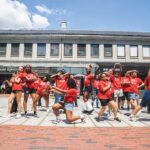
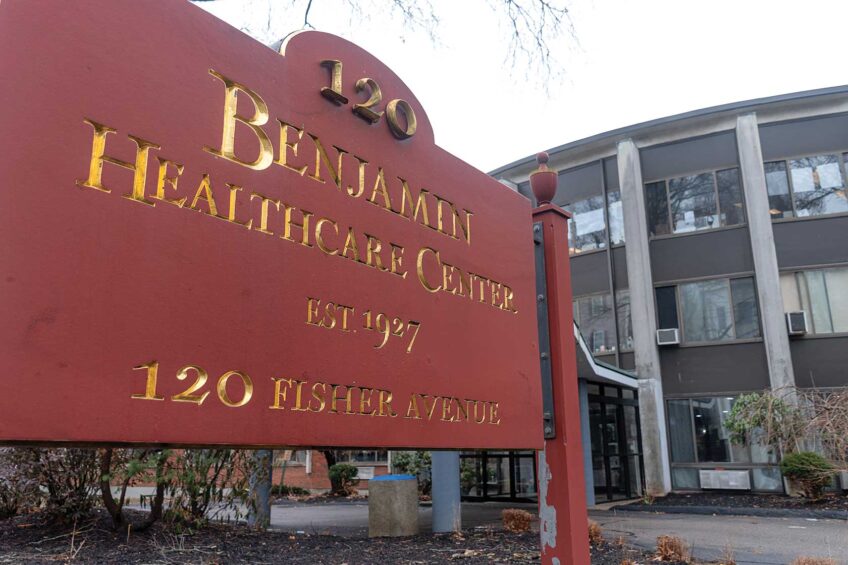
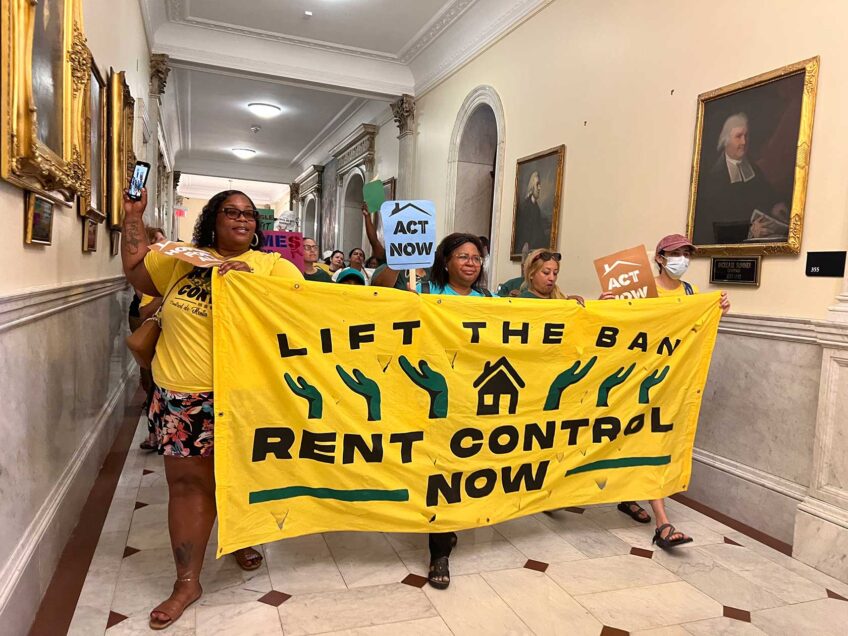
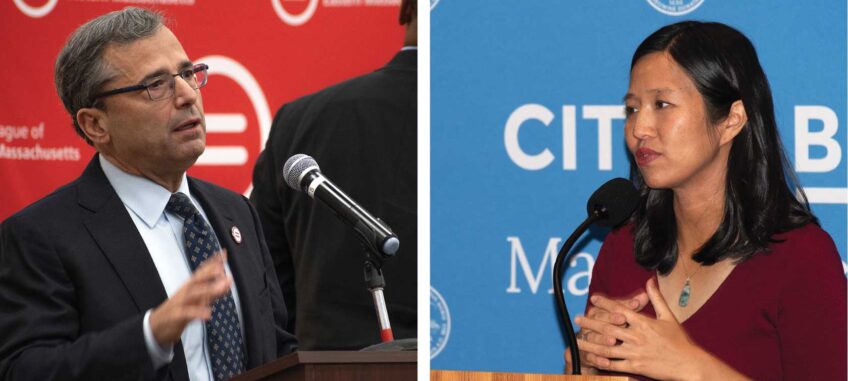
Leave a Reply
You must be logged in to post a comment.